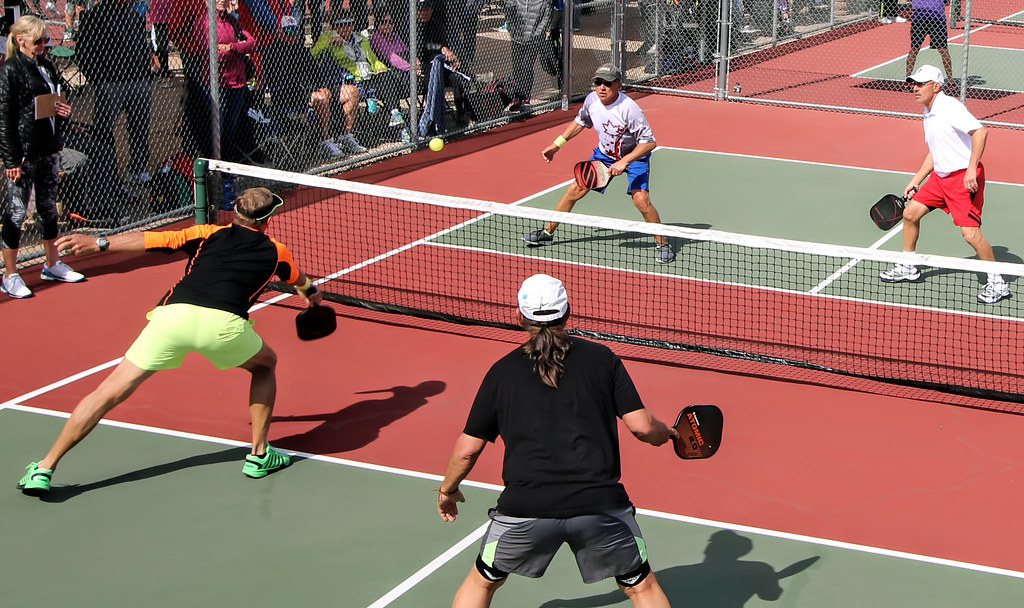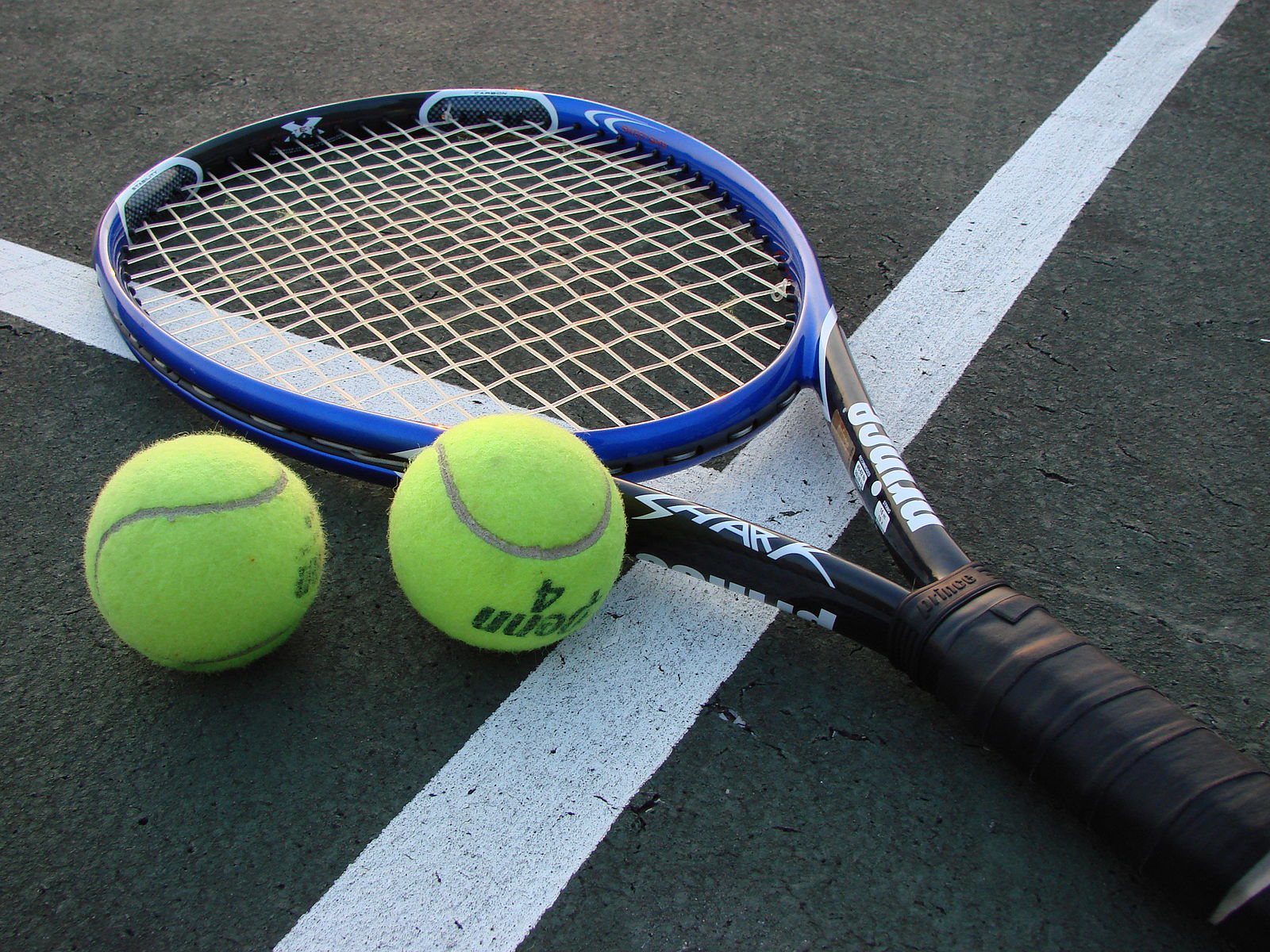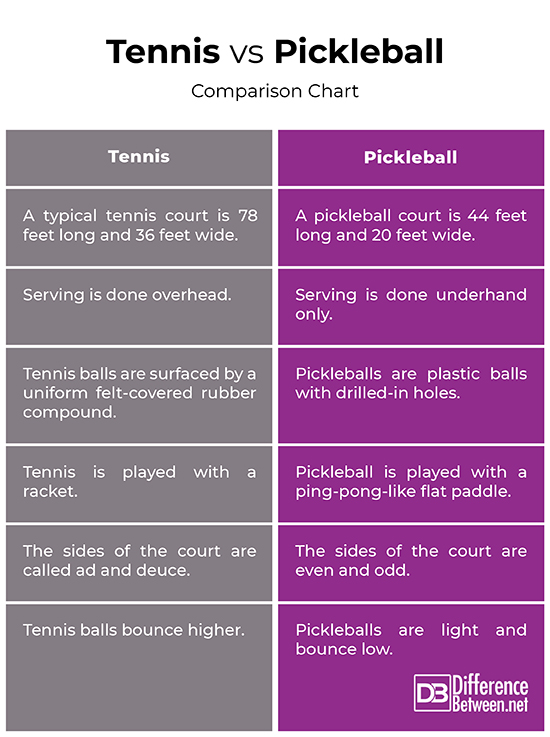Difference Between Tennis and Pickleball
Pickleball is one fun sport that has gained immense popularity in the last few years. Not only it is a recreational, social sport, it is also one of the fastest growing sports in America. It is gaining popularity because it’s easy to learn and fun to play. If you’re new to the sport, remember, pickleball is an interesting sport and highly addictive. We take a look at some key differences between pickleball and tennis.

What is Pickleball?
Pickleball is a fun, fast-paced sport that is gaining popularity around the world. It is a fun game for kids and adults to play together. It is one of the fastest growing sports in America. It is a paddleball sport that is a unique combination of three racket sports – tennis, table tennis and badminton – but has its own unique flavor. It is easy to learn and can be played by people of all ages. The small size of the court allows it to be played nearly anywhere. Like other racket sports, pickleball can be played singles or doubles, but most people prefer doubles. It is played with a flat paddle, which is a little bit bigger than a ping-pong paddle, and it comes in all sorts of shapes and sizes. Pickleballs typically come in two types: Outdoor and Indoor pickleballs.

What is Tennis?
Tennis is one of the three major racket sports played in singles or doubles formats. Tennis has come a long way – from an exclusive, niche pastime to a popular global sport. Tennis is now played in almost every corner of the world. Tennis’s initial exclusivity partly stemmed from its connections to earlier racket games, particularly Real Tennis, which was mainly played among the European royalty in the 16th century. Today, tennis is one of the world’s most popular individual racket sports. The player uses the racket to hit the ball over the net and into the opponent’s court. If the opponent fails to return the ball back, the player gets points. It is a four-point game and a player with a two-point lead wins. There are six games in a set and two or three games in a match.
Difference between Tennis and Pickleball
Court Size
– Although, the rules of both the games are pretty much similar, there are noteworthy differences between the two. The main difference between the two games is the size of the court. A typical tennis court is 78 feet long and 36 feet wide. The courts used for singles matches are 27 feet wide. A pickleball court, on the other hand, is about the same size as a double’s badminton court, measuring 44 feet long and 20 feet wide.
Equipment
– Tennis is played with a racket, which is like a bat with a long handle attached to a round frame with an open hoop across which a network of tightly interlaced strings is stretched. It ranges between 27 to 29 inches from butt to handle. Pickleball is played with a ping-pong-like flat paddle which varies in shapes and sizes. The paddle is smaller than a tennis racket. The balls are also different – unlike tennis balls which are surfaced by a uniform felt-covered rubber compound, pickleballs are plastic balls with drilled-in holes.
Scoring
– Scoring is very different in pickleball. First, serving is done underhand and the point of contact must be below the hip. Coming to scoring, pickleball is usually played to 11 points, win by two. You can score points only on the serve, and when you do score a point, you switch positions with your partner. Singles scoring is similar to doubles except there is no side out. Tennis is a four-point game and a player with a two-point lead wins. Each game is two to three sets.
Tennis vs. Pickleball: Comparison Chart

Summary
Although, pickleball borrows rules from a variety of racket sports, including tennis, it has its own unique charm, which clearly makes it a fun sport to play. It is also easier to learn, compared to tennis. Besides, both the sports can be played singles or doubles, but in pickleball, the serving is done underhand only. Also, there is no particular game structure in pickleball – the team to reach 11 points first and with a 2-point lead, wins the game. The game continues until a side wins by 2. Unlike tennis, you can only score when you’re serving.
Is pickleball easier to play than tennis?
The main reason why pickleball is gaining popularity is because it’s easier to learn and fun to play. Pickleball is generally easier on the body than tennis, but you need flexibility, mobility and strength to play pickleball. You have to bend your knees a lot.
Can you play tennis on a pickleball court?
A pickleball court is typically smaller than a tennis court, but if the lines are taped or painted on the pickleball court, it can be used to play tennis.
Are pickleball rules similar to tennis?
The rules are relatively similar, except the court size. Pickleball court is relatively smaller than tennis court. In pickleball, serving is done underhand, unlike tennis which requires overhead serving. And there is specific game structure in pickleball – you score only when you are serving.
Is pickleball easier than tennis for kids?
The court is typically smaller, so it’s a lot more fun as the kids do not have to spend so much time chasing the pickleball around, as they do tennis balls. Plus, the name pickleball sounds funny, which may fancy the kids. It’s also easy to learn and play.
- Difference Between Caucus and Primary - June 18, 2024
- Difference Between PPO and POS - May 30, 2024
- Difference Between RFID and NFC - May 28, 2024
Search DifferenceBetween.net :
1 Comment
Leave a Response
References :
[0]London, Martha. Pickleball. Minnesota, United States: ABDO Publishing, 2019. Print
[1]Leach, Gale H. The Art of Pickleball: Techniques and Strategies for Everyone. Arizona, United States: Acacia Publishing, 2005. Print
[2]Lake, Robert J. Routledge Handbook of Tennis: History, Culture and Politics. Abingdon, UK: Routledge, 2019. Print
[3]Image credit: https://live.staticflickr.com/7844/47108420782_2b6b0e6cba_b.jpg
[4]Image credit: https://commons.wikimedia.org/wiki/File:Tennis_Racket_and_Balls.jpg

Who serves when and for how long?